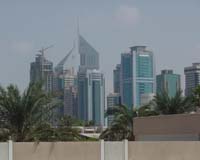 |
Gorleben, Germany (UPI) Nov 3, 2010 Greenpeace has warned of potential gas explosions at a nuclear waste storage site in Germany. In a few days, 11 containers filled with nuclear waste will be sent to the nuclear waste storage site of Gorleben in Lower Saxony. If they're lowered into the salt dome, the containers, which are up to 200 degrees Fahrenheit, could ignite natural gas reserves in the rock, Greenpeace said this week. The group cites neglected documents written by federal geologists that claim that vast gas reserves are locked under the dome. Workers drilling in the salt dome released some of the gas in 1982 and burned it. But there is much more, Greenpeace warns. And even if the gas isn't ignited, it might crack the dome's structure when it expands as a result of the heat emitted by the nuclear waste, the group said. That could lead to nuclear particles being emitted into the atmosphere. The German government therefore should abandon Gorleben because its safety is compromised, Greenpeace's Mathias Edler said at a news conference. "You shouldn't store the most dangerous waste humanity has ever produced on a powder keg," Edler said. German Environment Minister Norbert Roettgen recently ordered the resumption of work at Gorleben in Lower Saxony after a 10-year moratorium. Germany in the 1970s identified the salt dome as a potential storage site for highly radioactive waste. In 2000, the government composed of the Social Democrats and the Greens halted research there because of political differences and public protests. These parties remain in favor of looking for additional, potentially more promising locations. Yet Chancellor Angela Merkel's conservatives have favored looking into Gorleben again because they have already spent $2 billion on research there and because identifying alternatives is a political tightrope walk. To understand the protests that have accompanied Gorleben, one has to go back to 1973, when the search for a permanent storage site began. The government identified three promising sites, all in Lower Saxony. Gorleben wasn't among them but officials in Lower Saxony eventually settled for the salt dome. It's located in a sparsely populated area bordering former East Germany that the state wanted to boost economically -- a selection based on jobs, and not security, critics say. In the early 1980s, it turned out that the site has an unstable roof rock and is in contact with ground water. Critics of Gorleben argue in favor of other geological formations, such as granite or clay.
Share This Article With Planet Earth
Related Links Nuclear Power News - Nuclear Science, Nuclear Technology Powering The World in the 21st Century at Energy-Daily.com
 S.Korea may send troops to UAE over reactor contract
S.Korea may send troops to UAE over reactor contractSeoul (AFP) Nov 3, 2010 Seoul is considering sending about 150 soldiers to the United Arab Emirates to protect South Korean companies and workers who will be building nuclear power plants there, an official said Wednesday. An international consortium led by the state-run Korea Electric Power Corp last December won a 20.4-billion-dollar deal to build four nuclear power plants in the Middle Eastern country. Unde ... read more |
|
| The content herein, unless otherwise known to be public domain, are Copyright 1995-2010 - SpaceDaily. AFP and UPI Wire Stories are copyright Agence France-Presse and United Press International. ESA Portal Reports are copyright European Space Agency. All NASA sourced material is public domain. Additional copyrights may apply in whole or part to other bona fide parties. Advertising does not imply endorsement,agreement or approval of any opinions, statements or information provided by SpaceDaily on any Web page published or hosted by SpaceDaily. Privacy Statement |